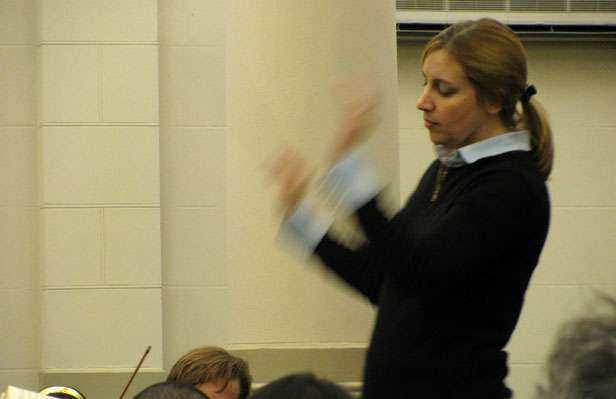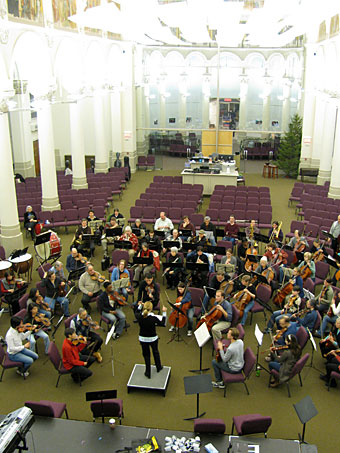Symphony benefits shelter with little Fanfare, much Joy

Cynthia Woods, music director of the Cambridge Symphony Orchestra, conducts a rehearsal Monday at the Greater Boston Vineyard Christian Fellowship on Rindge Avenue. (Photo: Marc Levy)

The orchestra, made up of adult amateur musicians from their 20s through their 80s, rehearses a Beethoven selection Monday in advance of a Sunday performance. (Photo: Marc Levy)
There are only two selections in Sunday’s concert by the Cambridge Symphony Orchestra, but they tell the whole story.
The first is the three-minute “Fanfare for the Common Man” by Aaron Copland, and the second is Beethoven’s Symphony No. 9, more than an hour of challenge and delight that includes four top soloists and culminates in “Ode to Joy,” sung by the Cambridge Community Chorus.
“For most of Beethoven’s life, he worshipped heroes, but as he became an old man he became disillusioned and realized the true heroes are friends, the people closest to us,” said Cynthia Woods, the symphony’s music director.
It’s a theme that resonates for the concert, the symphony and the chorus as powerfully as the selections will resound Sunday inside MIT’s Kresge Auditorium; the symphony and chorus are, in the words of orchestra vice president Charles Lin, made up of “your friends, neighbors and co-workers, who all play for the sheer joy of making music,” and a portion of the concert’s proceeds go to the Cambridge YWCA Shelter for Homeless Families.
These have been themes for the symphony since its founding in 1975 by Rachel Spiller, her mother and a friend, who shared complaints about how a local symphony was being run. Musicians would go to rehearsals and, a couple of weeks before a performance, find they were bumped down in prominence to make way for ringers, Spiller recalled. When they founded the Little Orchestra of Cambridge, Spiller and the other founders vowed they would never diminish a performer that way, instead relying on the artist to determine if a work was beyond their abilities.
It’s a principle that has never left the group, even when the Little Orchestra became the Cambridge Symphony Orchestra in its 20th year.
“Adult amateurs play because they love it and because there’s value in community, and all need to be valued for it to work,” Spiller said
From a couple of dozen players, the orchestra now boasts about 70, ranging in age from recent college graduates to people in their 70s or 80s.
Amy Nolan, a cellist who is among the younger orchestra players, appreciates that everyone “works 40 hours and they still have time to come out and rehearse. It’s very inspiring, and you feel you’re really contributing to something great.”
Since the beginning the orchestra has made it a point to invest in the community, performing free, private concerts for children at the Perkins School for the Blind and Cambridge youth centers and for seniors at assisted-living facilities or senior centers. With the arrival of Woods in 2006, the orchestra began choosing one of its four annual subscription concerts as a fundraiser for a nonprofit organization.
“Cynthia proposed the idea, and we sought out the organizations,” Spiller said. “It fit very well with our central mission of providing outreach.”
The first beneficiary was the Musicians’ Village in New Orleans — a project to rebuild musicians’ homes after Hurricane Katrina. Since then recipients have been based in Cambridge. With tickets ranging in price from $10 to $30 and children under 12 admitted without charge, the YWCA shelter could hope to see a few hundred dollars to help its mission.
“It’s not huge in dollars, but what we can do is raise awareness — put your name out there and give you a chance to have an info table there,” Spiller said.
Eva Martin Blythe, executive director of the YWCA, called the offer of partnership by the symphony “the best thing to happen to us in a long time.” For about a year and a half, the 10 family slots the shelter offers have been filled constantly with members of the working poor blindsided by the economic downturn, straining shelter wish lists, so “we’re looking for these kinds of partnerships.”
People are invited to donate and look through the YWCA wish list at any time, but there will indeed be a shelter information table at the Sunday event, Martin Blythe said.
In addition to awareness of the shelter’s needs, those attending the concert get another, more obvious benefit: the music itself, as conducted by Woods, whose work — after first drawing her from Madison, Wis., to attend the Hartt School in Hartford, Conn., then to Boston’s South End — has brought her around the country and overseas. (Work conducted by her has been called “dynamic and immersive,” and she gets top marks from her performers as well. “Cynthia’s great,” Nolan said after rehearsal Monday. “It’s easy to get caught up in her energy.”)
As music director, Woods said, she looks for selections “that will be relevant to the players, musically inspiring and valid to the audience. It’s good to pick something that speaks to people fundamentally on an emotional level.” This season focuses on “who we are,” she said, and the Beethoven and Copland address that in similar ways, with Copland’s short piece written during World War II to celebrate “not just soldiers but everyone trying to help the cause” and Beethoven’s four-movement Symphony beginning with a martial tone and grand themes and slipping sweetly into a simple love song three-quarters of the way through. It ends with a celebration of brotherhood and humanity.
“Having seen Napoleon and war,” Woods said, Beethoven ended his composition suggesting “friendship and love sees us through our lives.”
It’s ideal for an institution that is “not just an orchestra, but an organization that has a large sense of community,” Woods said.
After Sunday’s performance, the Cambridge Symphony Orchestra can next appears Jan. 17 for a celebration of Dr. Martin Luther King Jr. with the music of Duke Ellington and Joseph Schwantner.
The Cambridge Symphony Orchestra’s gala opening concert, benefiting the Cambridge YWCA Shelter for Homeless Families, takes place at 4 p.m. Sunday at the Massachusetts Institute of Technology’s Kresge Auditorium, off Massachusetts Avenue between Central Square and Memorial Drive. There is free parking available in the West Garage on Vassar Street. Tickets for “Fanfare for the Common Man” by Aaron Copland and Symphony No. 9 by Ludwig van Beethoven, performed with the Cambridge Community Chorus directed by Jamie Kirsch, are, in advance, $15, or $10 for seniors; and at the door $20, or $15 for seniors. Children under 12 are admitted free. Benefactor rickets (with Reserved Seating) are $30. For information, call (617) 576-1819 or click here.

